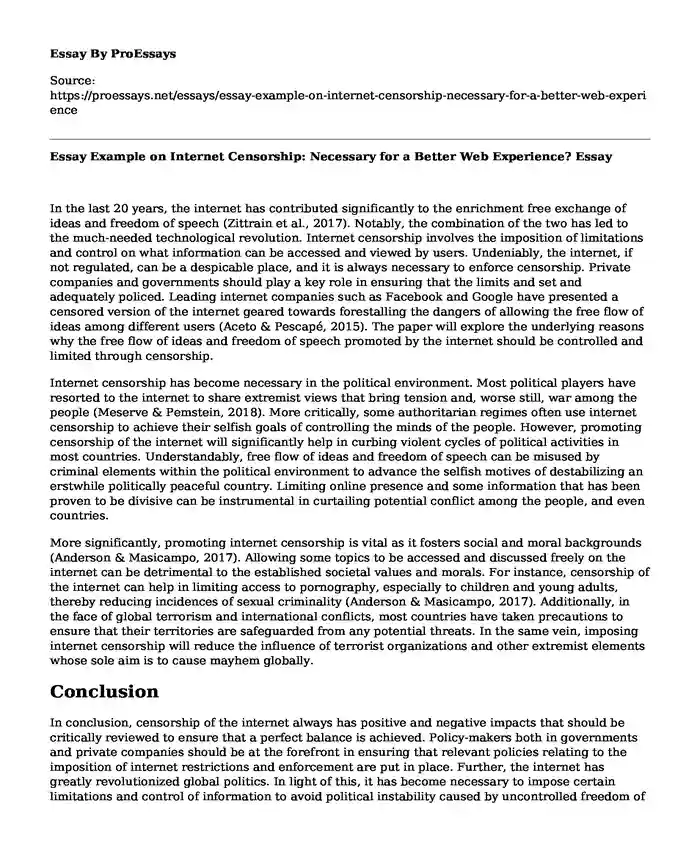In the last 20 years, the internet has contributed significantly to the enrichment free exchange of ideas and freedom of speech (Zittrain et al., 2017). Notably, the combination of the two has led to the much-needed technological revolution. Internet censorship involves the imposition of limitations and control on what information can be accessed and viewed by users. Undeniably, the internet, if not regulated, can be a despicable place, and it is always necessary to enforce censorship. Private companies and governments should play a key role in ensuring that the limits and set and adequately policed. Leading internet companies such as Facebook and Google have presented a censored version of the internet geared towards forestalling the dangers of allowing the free flow of ideas among different users (Aceto & Pescapé, 2015). The paper will explore the underlying reasons why the free flow of ideas and freedom of speech promoted by the internet should be controlled and limited through censorship.
Internet censorship has become necessary in the political environment. Most political players have resorted to the internet to share extremist views that bring tension and, worse still, war among the people (Meserve & Pemstein, 2018). More critically, some authoritarian regimes often use internet censorship to achieve their selfish goals of controlling the minds of the people. However, promoting censorship of the internet will significantly help in curbing violent cycles of political activities in most countries. Understandably, free flow of ideas and freedom of speech can be misused by criminal elements within the political environment to advance the selfish motives of destabilizing an erstwhile politically peaceful country. Limiting online presence and some information that has been proven to be divisive can be instrumental in curtailing potential conflict among the people, and even countries.
More significantly, promoting internet censorship is vital as it fosters social and moral backgrounds (Anderson & Masicampo, 2017). Allowing some topics to be accessed and discussed freely on the internet can be detrimental to the established societal values and morals. For instance, censorship of the internet can help in limiting access to pornography, especially to children and young adults, thereby reducing incidences of sexual criminality (Anderson & Masicampo, 2017). Additionally, in the face of global terrorism and international conflicts, most countries have taken precautions to ensure that their territories are safeguarded from any potential threats. In the same vein, imposing internet censorship will reduce the influence of terrorist organizations and other extremist elements whose sole aim is to cause mayhem globally.
Conclusion
In conclusion, censorship of the internet always has positive and negative impacts that should be critically reviewed to ensure that a perfect balance is achieved. Policy-makers both in governments and private companies should be at the forefront in ensuring that relevant policies relating to the imposition of internet restrictions and enforcement are put in place. Further, the internet has greatly revolutionized global politics. In light of this, it has become necessary to impose certain limitations and control of information to avoid political instability caused by uncontrolled freedom of speech. More fundamentally, promoting internet censorship will help enrich the social and moral values necessary for a progressive society. Also, imposing restrictions and control on the internet will help track criminal and terrorist organizations' activities, thereby fostering global peace.
References
Aceto, G., & Pescapé, A. (2015). Internet censorship detection: A survey. Computer Networks, 83, 381-421. https://www.sciencedirect.com/science/article/abs/pii/S1389128615000948
Anderson, R. A., & Masicampo, E. J. (2017). Protecting the innocence of youth: Moral sanctity values underlie censorship from young children. Personality and Social Psychology Bulletin, 43(11), 1503-1518. https://journals.sagepub.com/doi/abs/10.1177/0146167217722557
Meserve, S. A., & Pemstein, D. (2018). Google politics: The political determinants of Internet censorship in democracies. Political Science Research and Methods, 6(2), 245-263. https://pdfs.semanticscholar.org/effc/b72f9db35e06219a93a64a2d9bbd6c97a15f.pdf
Zittrain, J. L., Faris, R., Noman, H., Clark, J., Tilton, C., & Morrison-Westphal, R. (2017). The shifting landscape of global internet censorship. Berkman Klein Center Research Publication, (2017-4), 17-38. https://papers.ssrn.com/sol3/papers.cfm?abstract_id=2993485
Cite this page
Essay Example on Internet Censorship: Necessary for a Better Web Experience?. (2023, Sep 23). Retrieved from https://proessays.net/essays/essay-example-on-internet-censorship-necessary-for-a-better-web-experience
If you are the original author of this essay and no longer wish to have it published on the ProEssays website, please click below to request its removal:
- Essay on Social Media in China and America and Its Economic Impact
- Windows Server Networking Paper Example
- The Anonymity of Data Essay
- Five Challenges That Arise While Virtualization to Store Data Paper Example
- Essay Example on Robust IT Systems: A Necessity for Business Entities
- Essay Example on Open-Source Database Tools: Gaining Industry Momentum
- Essay Example on Healthcare: Usability Challenges for Data Exchange & Integration







